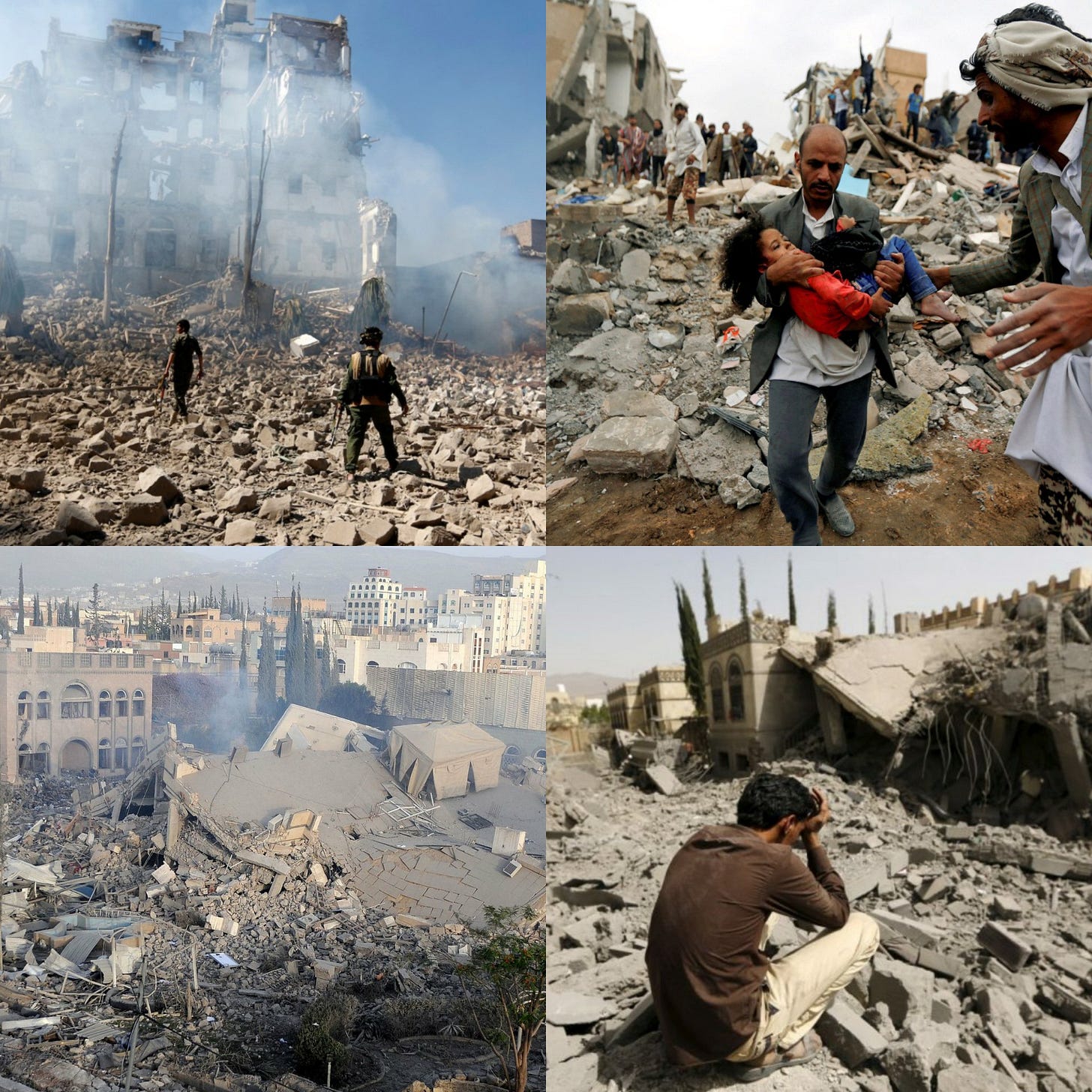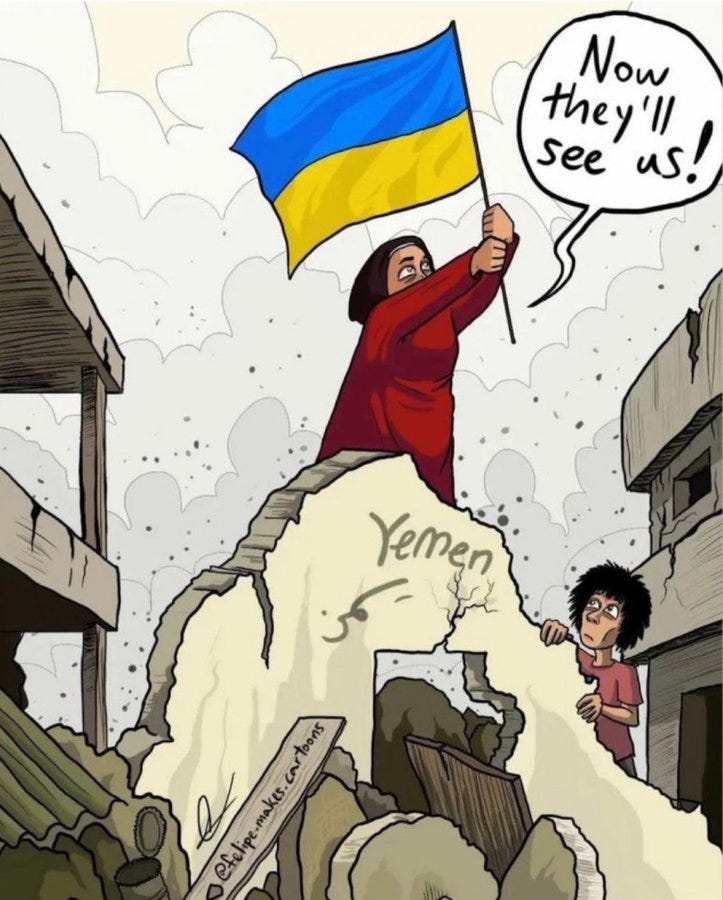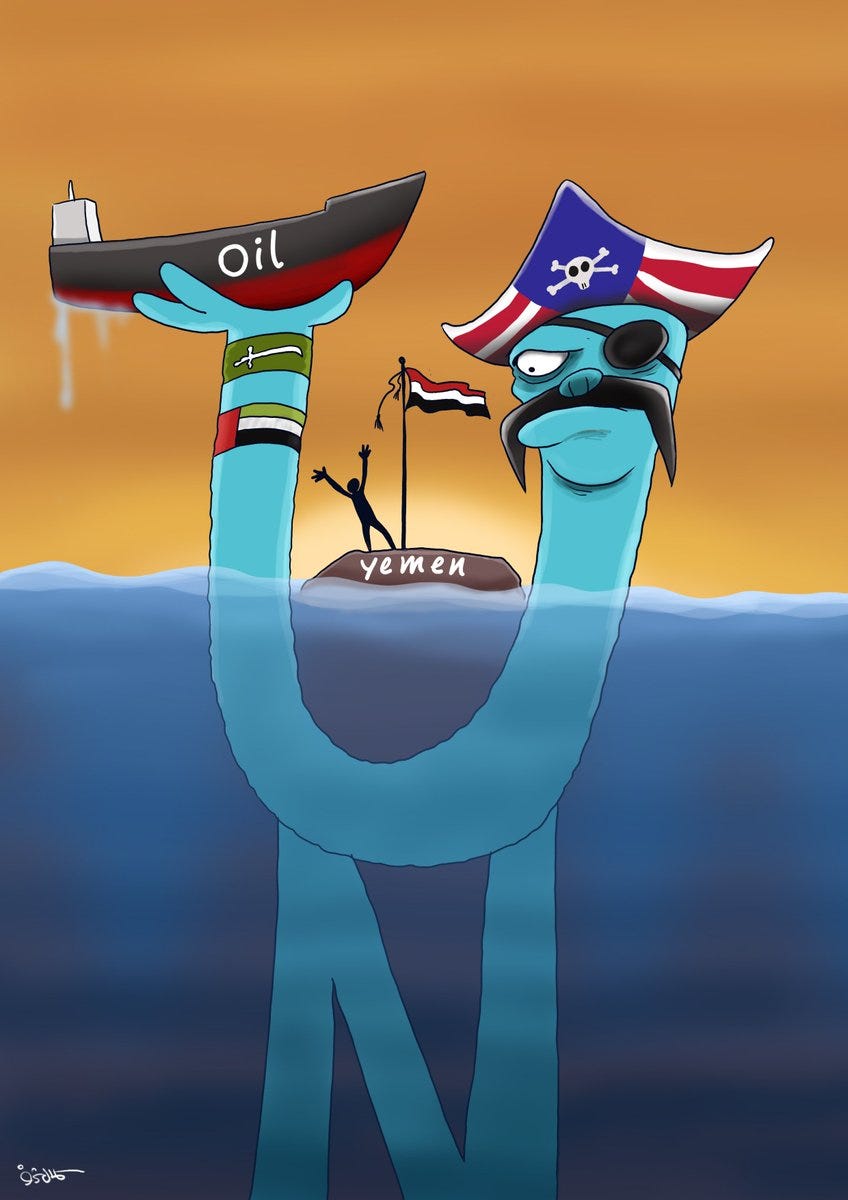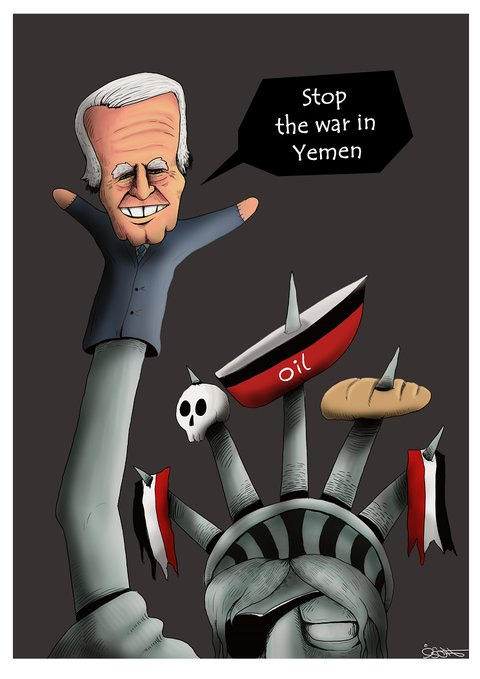Forgotten War in Yemen
Civil War is still raging and famine is escalating while the media remains comfortably numb
Seven years have passed since the Yemeni Civil War began and it is still ongoing, with no end in sight. Forgotten or sidelined by the mainstream media, most of the international public is unaware of the atrocities that takes place in Yemen.
As the world’s eyes are currently (and rightfully) drawn to the Russia-Ukraine war, middle-eastern social media pundits are using different tactics to draw attention to the massive humanitarian crisis and bloody war in Yemen. On Twitter, while scrolling on Ukraine-related hashtags like #Ukraine️, #UkraineUnderAttaсk, and #UkraineRussiaWar it’s difficult to miss the posts from Arab social media activists, stealing attention from the audience to the hot places of the middle east.
All of us should be grateful for this effort.
Many important news, including horrible wars and massive famine, can go unnoticed by international spectators, as media remains painfully quiet on these important topics.
Yemen Civil War
Yemen is a country located in the south of the Arabian Peninsula. It borders Saudi Arabia to the north and Oman to the northeast. Yemen's population is about 30mln and the country is very poor, GDP per capita is only $937, 208th place in the world (from 216 countries).
The civil war began in late 2014 mainly between the Abdrabbuh Mansur Hadi-led Yemeni government and the Houthi movement, along with their supporters and allies. Hadi is a de-facto president, who is mostly in hiding in Saudi Arabia, involved party and his ally in this war. Houthi movement is not recognizing Hadi’s government and they currently control the capital Sanaa and most of North Yemen.
A Saudi-led military coalition joined the war in March 2015, with the aim of restoring President Abdrabbuh Mansour Hadi to power. For this means, Saudi Arabia is supporting pro-Hadi forces, and the United Arab Emirates is backing southern separatists. The United States provided intelligence and logistical support for the Saudi-led campaign before 2019 when Congress ended it, also stopping the sale of arms to Saudi Arabia, but the US still sells arms to UAE.
Also for the whole picture, it should be mentioned that Al-Qaeda in the Arabian Peninsula (AQAP) and the Islamic State are also presented in Yemen, attacking other actors and from time to time controlling some small coastal territories as well.
Per United Nations data, by the end of 2021, the death toll from the conflict was estimated to be around 377,000 lives, with 154,000 as a result of direct combat and violence and 223,000 lives from indirect effects.
The situation in the country has been described by the UN as the world’s worst humanitarian disaster.
At least 15.6 million people live in extreme poverty.
As the Saudi-led blockade continues and the agricultural sector in Houthi-controlled territory is destroyed, for food supplies, Houthis are dependent on imports that are almost impossible to obtain. This led to the food shortage and famine that Yemen is still suffering for the last few years.
People are desperate, hungry, and have no hope left for the international community to finally discover humanity and provide some real help.
Bombing
Saudi Arabia-led relentless bombing continues in 2022. In January more than 650 civilians were killed by air raids, shelling, and other violence. This is the highest monthly death toll of civilians per UN data. The coalition used a precision-guided munition made in the United States during the January airstrikes on a detention center in Sa’adah. Per Amnesty International, this attack has killed at least 80 people and injured over 200.
The intervention that started in 2015 was code-named Operation Decisive Storm and it initially consisted of a bombing campaign on Houthi rebels. Later it expanded into the naval blockade and the deployment of ground forces as well.
More than 70 health facilities in Yemen have been destroyed by bombing campaigns. Approximately 1,500 schools were damaged and destroyed during the Yemeni Civil War.
Famine
Since the start of the Yemeni Civil War, the food insecurity crisis has been ongoing. As a result of 7 years of devastation, Yemen was already facing one of the world’s worst humanitarian crises in 2021. Since the start of 2022, it is getting worse.
During 2014-2020 UN estimated around 130,000 deaths from lack of food and healthcare. In March 2021 U.N. agency was projecting around 400,000 Yemeni children under the age of 5 could die from malnutrition within the next one year, as the U.S.-backed Saudi-led war and blockade continued.
According to the UN, the 2021 humanitarian plan for Yemen received only $2.27bn of its $3.85bn requirements, the lowest funding level since 2015. Even with the underfunded efforts aid agencies provided food, clean water, healthcare, and other types of assistance to more than 11 million people. Since 2022, the funding plans are unknown and the expectations are that it will further be reduced or even closed.
Joyce Msuya, UN Assistant Secretary-General for Humanitarian Affairs & Deputy Emergency Relief Coordinator voiced this concern on social media:


Media Coverage
Yemeni war is largely ignored by the western press. You will rarely see the leading media outlets’ in-depth coverage of the crisis - being it Saudi Arabia-led coalition airstrikes, blockade, disastrous famine, or US support for this war. Unless of course, a famous celebrity like Angelina Jolie is visiting the country for humanitarian efforts. In this case, it is certainly newsworthy and deserves a comprehensive 200-word post on CNN.
There are many reasons why the United States media being silent, main causes being:
No clear antagonists to despise.
Saudi Arabia is an ally, the main cause of civilian death tolls in Yemen.
No Americans are in danger (e.g. ISIS threat in Syria was much easier to sell).
The US is still indirectly backing the war.
Without detailed mainstream media coverage, Yemeni people are left without any attention from the international public.
Al Jazeera, a Qatari sovereign-funded international news channel is an obvious exception to Western media, as they cover predominantly Arab-world news. On this link, available on the Al Jazeera youtube channel you can find the short video covering the aspects of ongoing war and recent escalations.
Social Media activism
Yemeni and Arab activists nowadays are begging for international attention. As the devastating airstrikes, blockade and famine are escalating this year, it is vital for the international community to open its eyes to the Yemeni war.
Even if the war stops today, it will take multiple decades for the country to recover, but what’s even more troubling is that no solution is discussed at the moment and it is getting worse…
Here are some of the popular images and caricatures you will frequently see in the respective Yemen-related social media feeds:
Peace!










